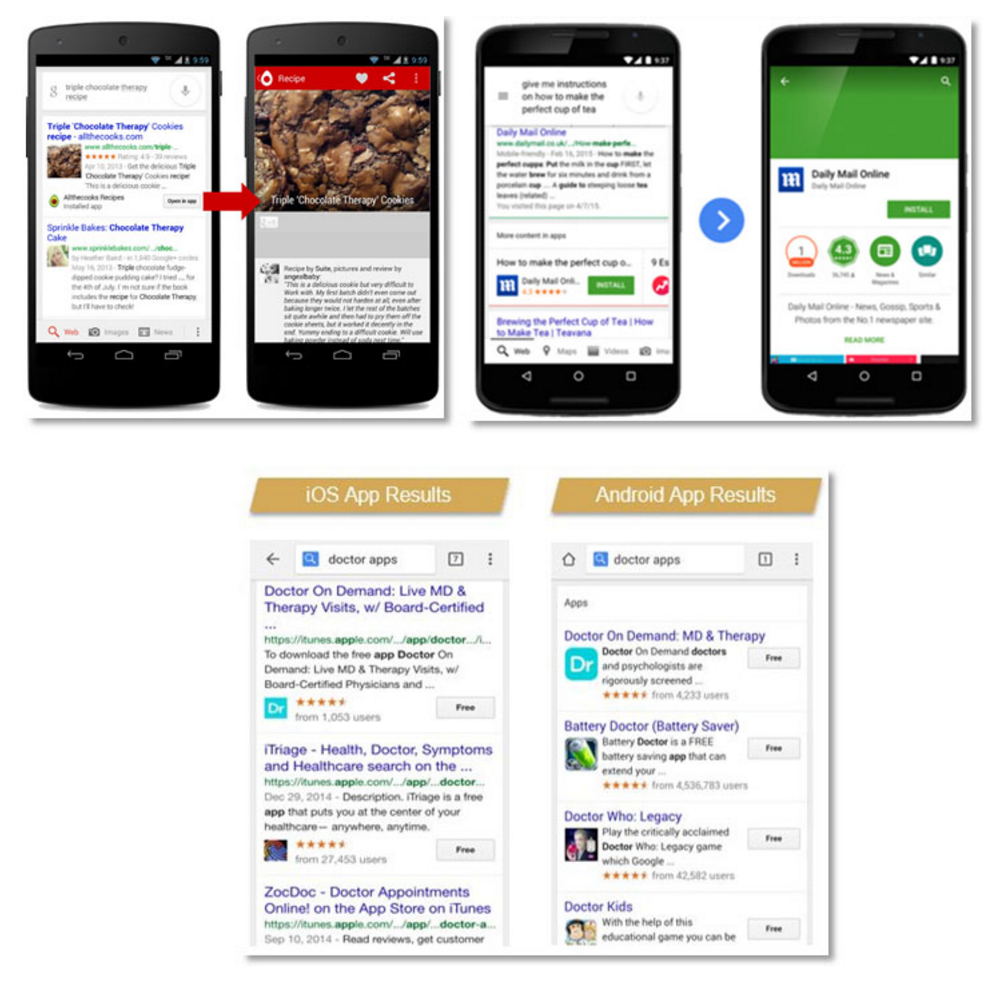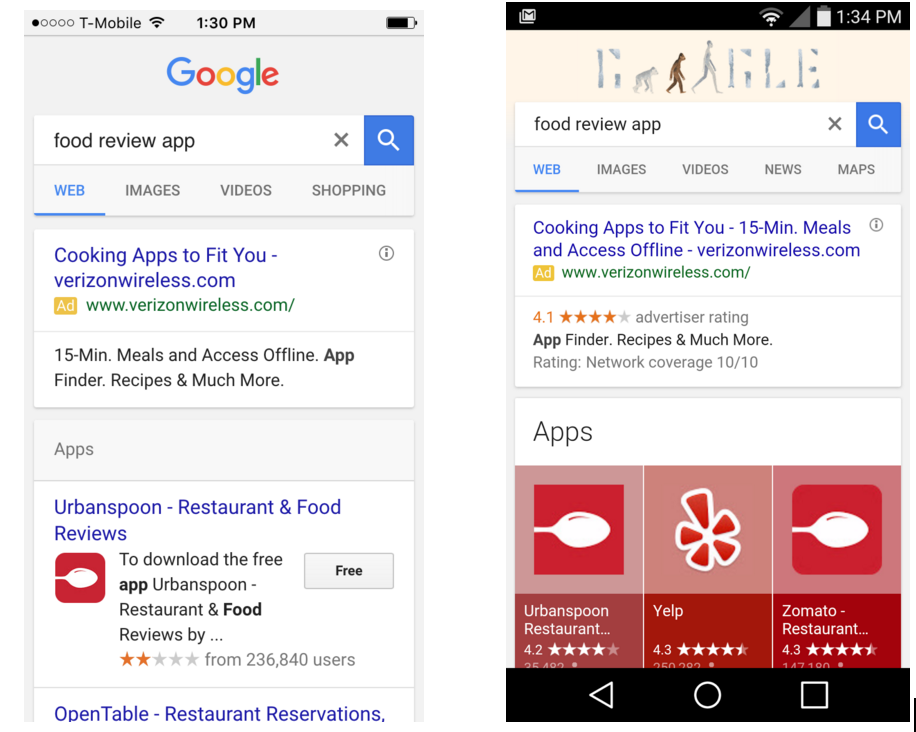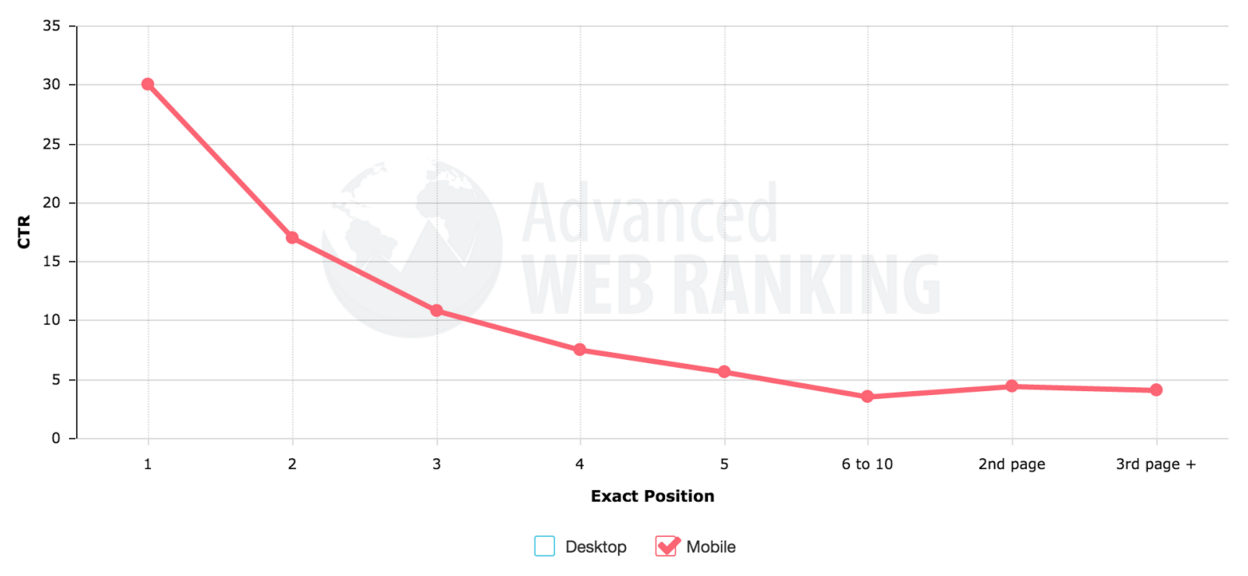Ranking No. 1 in a search result page is something that every business wants, especially if you are making an effort to build your web presence. As any SEO specialist will tell you, claiming that coveted top spot can take significant amounts of time, effort and money to optimize your website and gain enough authority to surmount the SERPs mountain. But as algorithms are updated and our digital marketing world develops, new opportunities surface for websites to capitalize on, which brings us to why we are all here: app indexing and how it can impact your SEO efforts.
Let’s start by defining app indexing.
Getting your app indexed on Google allows for deeper searchability on mobile devices, and it allows for the in-app content to be crawled. This produces search results that can lead you to new apps on Android devices, or it can resurface and rediscover apps you’ve already downloaded as a resource to find what you are looking for on both Android and iOS*.
*It is important to highlight that the current benefits go deeper when apps are developed for Android versus iOS. Google has more capability with Google Play than it does in the Apple app store, simply because Google owns the Google Play app store; so, sorry iOS peeps, but it looks like Android gets the nod with app indexing…for now.
Here are a few examples of what it’ll look like when an app is indexed:
iOS vs. Android
As you can see, even with the difference in depth of information provided, it is still useful and beneficial to index apps running iOS, but the more significant information is presented through Android / Google Play. As of right now, there isn’t any specific information floating around about iOS deep linking in apps, but it doesn’t mean it won’t ever happen. We will just have to wait and see.
Why is this happening?
I like to say, “I practically work for Google.” And what I mean by this is, I work for Snap Agency, but almost everything we do is because Google says so. We play by their rules, optimize websites the way they say is best and design things because Google told us to. Google does what Google wants, and its general purpose for app indexing is to allow for a less clunky user experience. They want search results to be of high quality, and the transition between content within web pages and apps to be seamless and easy without having to decide whether or not the user should download an app or not. The information is just right there.
I recently had a conversation with a friend who works as a director of IT at Great Clips, the world’s largest salon brand. He is also one of the lead thinkers and visionaries for mobile development, and throughout our conversation, he started to project that instead of the web being a place filled with websites, it would look a lot more like a vehicle to engage with apps. His thought is that apps are being developed to perform specific tasks extremely effectively, and so we will begin to integrate these apps into our daily lives more and more. This is especially the case with the wearable technology market growing and apps being integrated not only into phones, but into our vehicles, watches and other pieces that are connected to our everyday life. He predicts that apps will continue to take over more and more of our online use, and looking into the future, we will use apps exponentially more than we are now. This seems to fall in line with how Google is integrating apps into SERPs and it will be interesting to see how it plays out.
Benefits of app indexing.
Right off the bat, the primary benefit is that app indexing will provide increased exposure of your app—leading to more downloads, more reviews and more users. Now, that is a high view of what the possible benefits could be, so let’s dig a bit deeper.
What does “increased exposure” really mean?
Google is utilizing deep links within apps and accessing a lot more content through app indexing. SERPs are not only showing web results now, but they are opening a whole new door by showing content that is within the apps themselves, creating an opportunity for those with an app to be shown in relevant Google searches. This means that Google is accessing massive amounts of information that it wasn’t before and is completely changing the way that app discovery can happen.
On November 18, Google also announced that it is testing the capability to show app-only content in search results! It is currently running this with nine select apps, but the impact this could have on SEO is almost too large to comprehend right now. With over 2 million apps on the market, Google search results could potentially become so accommodating that we interact with apps and web pages seamlessly and the amount of information we would be looking at any time we conduct a Google search would skyrocket. (The apps that Google is currently testing are: Chimani, Daily Horoscope, Gormey, Hotel Tonight, My Horoscope, New York Subway, Useful Knots, Visual Anatomy Free and Weather Channel)
Engagement
When people search with mobile devices and engage with app content, they start to place value on your app. This engagement is no longer confined to those searching within the app store, but it can now start from a simple search, and you won’t have to rely on the memory of people to use your app because re-engagement will be prompted by Google.
Who will benefit most?
Looking for a new holiday recipe? Or are you wanting to discover hidden gems in the your city? You are the most likely to be exposed to indexed apps. Looking at my own app use, the initial benefit will be for information and ecommerce-based apps like Amazon, Etsy or even collaborative apps like Pinterest. Other quick and easy apps will be travel apps, like Hotelstonight, Airbnb or similar apps. Informational apps seem like they will be the first to compete for SERP space, and other apps will get creative in how they utilize app indexing for their benefit.
What is the difference between app indexing and ASO?
At first glance, app indexing and ASO (App Store Optimization) can look very similar, but they are in fact two separate ways to optimize your app and to create new ways for users to engage with you.
App indexing is connected to search engines, and ASO is the act of optimizing your app for when someone is searching for an app within an app store. Both of these forms of optimization are extremely important for those with apps, but we don’t want to confuse the two forms.
Quick Benefits of ASO:
With so many apps in the market, there is plenty of competition for exposure and app use. In the same way that anyone who is overseeing a website wants to rank among the top results in search engines, an app developer wants to rank first when a search is conducted in an app store.
According to Forrester Research, 63% of apps are discovered through app store searches, which is the highest means of discovering an app, beating out word of mouth, browsing “top rated” or “most popular” lists, pre-installed apps, social mediums, Internet browsing, seeing ads, and reading about an app on a blog.
So, once you’re done setting up your amazing app to be indexed, you may want to make sure that it is fully optimized on app stores! Check out this ASO article by Larry Kim.
Making app indexing happen.
Thankfully, Google has made the app indexing process quite simple. Through a little interaction between your app and Google, setting up the necessary pieces for Android apps and iOS apps can happen in an afternoon. It will take a little longer for Google to start indexing your app, but if you are looking for an opportunity to pump up the exposure your app gets, you’ll want to make it happen.
Search engine optimization
For those with an app in the market, app indexing holds a lot of great potential for growing the number of searches your brand shows up for and can provide for easy conversion. Because Google is still in the process of testing various elements of the degree to which they choose to index information, there are plenty of opportunities that developers can jump on to stay ahead. Another mysterious quirk of Google is that it tends to reward those who engage with what they have going on. It’s not an exact science, but historically, they favor those who play along and try new strategies and techniques they roll out. Like I said, there is rarely a specific portion of data that you can point at in a report and say, “See! Google likes us!” But it is worth mentioning.
Having an app also brings your relevant in-app information right to the top of the search engine results page. Again, Google is doing what is best for them, which means that if your app will provide for a better user experience than web content, they want traffic to be pointed to you. You’ve invested a lot into your app, and it is designed to execute a particular task and be used on a mobile device, so start indexing!
A good experience equates to return visitors.
Those who get the chance to discover a new app will likely return. Plus the problem with a decrease in return users is addressed with app indexing, because if a user has forgotten how awesome your app is, Google will show it as a search result to create re-engagement! Android devices will also be auto completing a search inquiry with app resources.
Increased competition
Most websites are not associated with an app, which means that those folks will need to step up their SEO game in order to compete with this influx of high-ranking information.
Roughly 75 percent of searchers click through to one of the links that appear on page one of search results, and the first place holder garners a CTR of about 30 percent. So, if you were ranking in the first organic search result, your CTR could go from 30 percent down to roughly 17 percent, and around 10 percent if you are in the third position, so you clearly want to hold on to the strongest position possible.
If you have questions about how to take your SEO efforts to the next level, or if you’d like to optimize your app, reach out to us! We would love to connect and talk through optimization options with you.
Cheers



